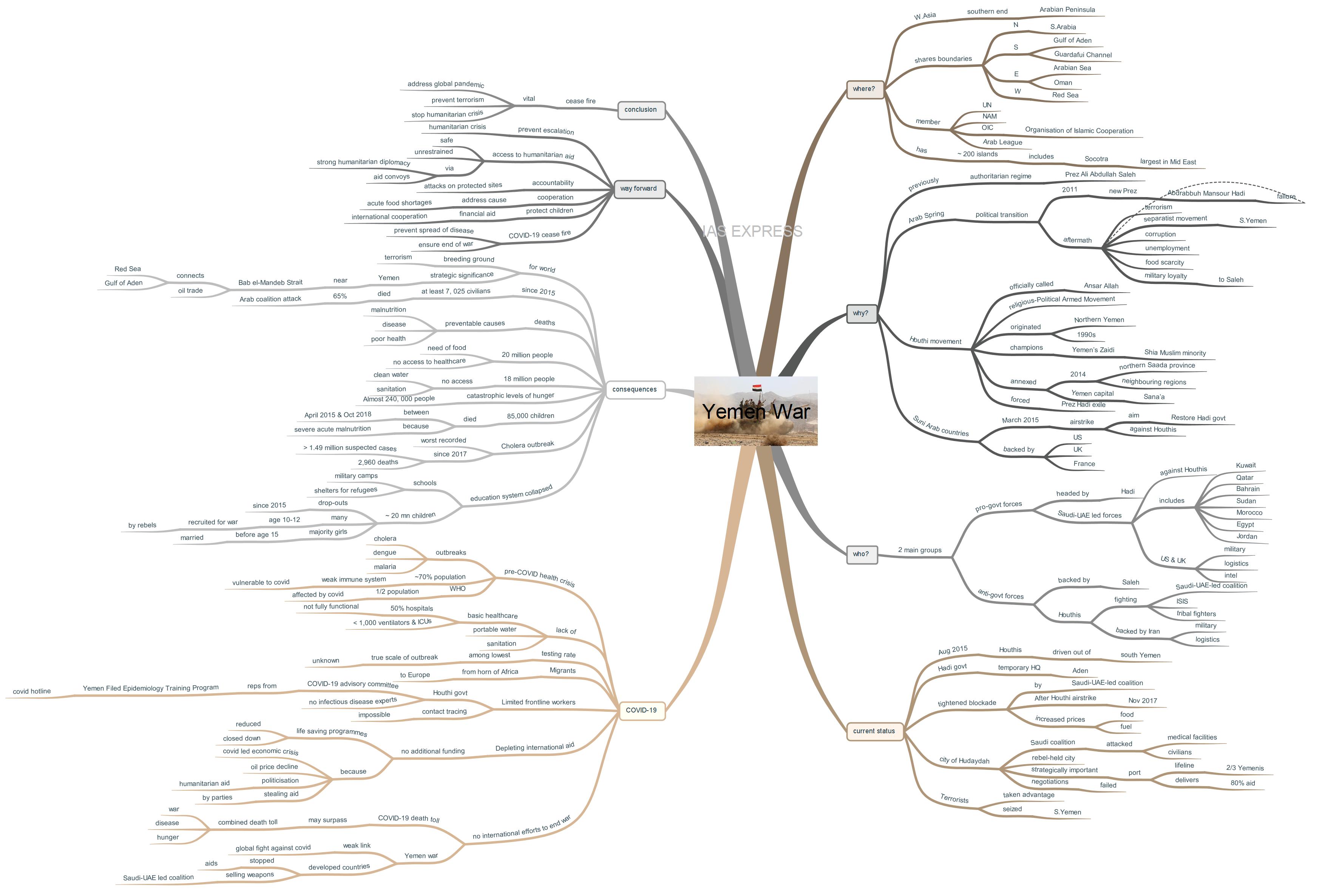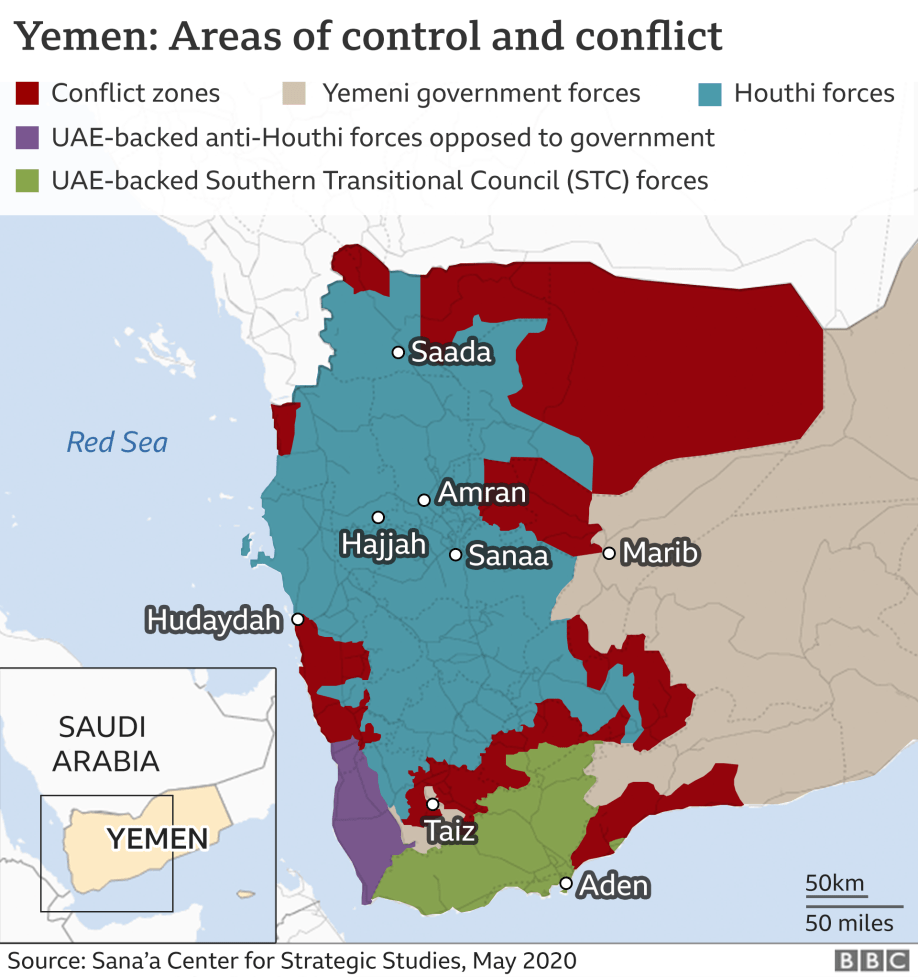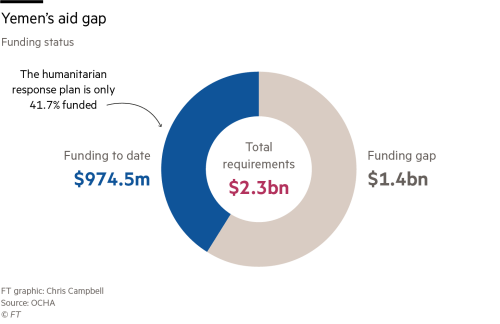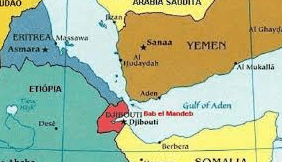[Updated] Yemen Civil War – Explained
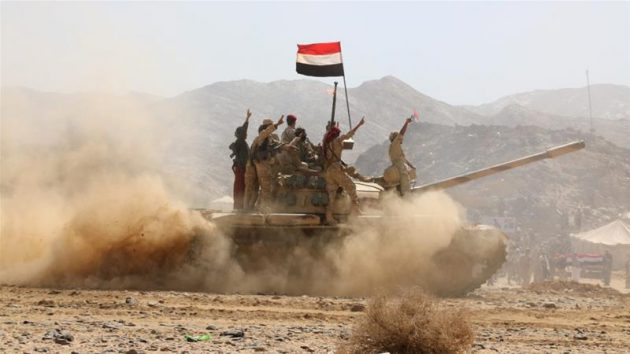
Since the start of the war in Yemen, one of the poorest countries in the world has been turned into a humanitarian catastrophe. Five years since the initiation, the military campaign in Yemen has failed to provide peace for the war-torn country. This, in turn, crippled country’s healthcare and other basic utilities, creating a weak link in containing the COVID-19 pandemic that is causing havoc in the global health scenario and economic progress.
Where is Yemen?
- Yemen is a country located at the southern end of the Arabian Peninsula in Western Asia.
- It shares a boundary with Saudi Arabia in the north, has the Red Sea to the west, the Gulf of Aden and Guardafui Channel to the south and the Arabian Sea and Oman in the East.
- It is the member of UN, Non-Aligned Movement, Arab League and Organisation of Islamic Cooperation.
- Yemen houses about 200 islands that include the largest island in the Middle East, Socotra.
- Currently, Yemen is facing a crisis due to the on-going civil war between two factions: the Yemeni government led by Abdrabbuh Mansur Hadi and the Houthi armed movement and allies.
Why is there a war?
- Yemen was previously under the authoritarian regime of President Ali Abdullah Saleh.
- As the result of the Arab Spring, a series of protests and armed rebellions that spread across North Africa and the Middle East in the early 2010s, Yemen underwent a political transition.
- In 2011, president Saleh’s was forced to hand over the power to his deputy Abdrabbuh Mansour Hadi.
- President Hadi, during the initial stages of his regime, faced several problems like:
- Terrorism
- The separatist movement in south Yemen
- Corruption
- Unemployment
- Scarcity of food
- Military’s loyalty to President Saleh
- President Hadi failed to solve these problems efficiently.
- The Houthi movement, officially called the Ansar Allah (Supporters of God), is an Islamic, religious-political Armed Movement that originated in Northern Yemen in the 1990s.
- This movement, which champions Yemen’s Zaidi, a Shia Muslim minority, took advantage of President Hadi’s weakness and annexed the northern Saada province and the neighbouring regions in 2014.
- The Houthis further took control of Sana’a, the capital of Yemen.
- This forced President Hadi into exile.
- This conflict escalated when Saudi Arabia along with other Sunni Arab countries began airstrike against the Houthis in March 2015.
- These countries were backed by the US, the UK and France.
- This coalition justified this move by stating that they are aiming to restore Mr.Hadi’s government.
Who is fighting against whom?
- Multiple factions are involved in this war.
- These factions can be categorized into two main groups: the pro-government forces and the anti-government forces.
- The pro-government forces are headed by President Hadi while the anti-government was backed by Saleh.
- The Houthis, the anti-government force, is fighting a mix of Saudi and Emirati-backed government troops, Islamic State militants and tribal fighters.
- In 2015, the Houthis were forced out of the majority of Yemen’s southern provinces.
- The Hadi government accuses Iran of backing the Houthis by providing military and logistics support.
- Iran denies this allegation.
Why is Saudi Arabia involved?
- To Saudi Arabia, Houthis’ success in the on-going Yemen war is a liability.
- This is because the Houthis are backed by its regional rival, Iran
- Saudi Arabia and UAE have conducted an airstrike against the Houthis in the Yemen territory.
- Other Arab countries like Kuwait, Qatar, Bahrain, Sudan, Morocco, Egypt and Jordan have backed this move.
- The US and the UK have provided Saudi Arabia with the military, logistic and intelligence support.
What is the current status of the war?
- Yemen War continues to persist for more than four years, with Yemenis being trapped between Houthi forces that control the capital Sana’a and Saudi-led coalition that continuously bombs them.
- On August 2015, the coalition has successfully driven out the Houthis out of much of south Yemen in the initial few months.
- President Hadi’s temporary government was established in Aden but it still struggles to provide basic necessities like food for the Yemen citizens.
- Houthis were able to fire missiles at Saudi Arabia, which led to the tightening the blockade around Yemen by the Saudi-UAE-led coalition in November 2017.
- This blockade substantially increased the prices of food and fuel in Yemen which in turn led to food insecurity for the Yemenis.
- In June 2018, the coalition planned on gaining a strategic advantage by attacking the rebel-held city of Hudaydah.
- The government forces conducted airstrikes, endangering medical facilities and thousands of civilians.
- The city of Hudaydah is strategically significant because its port is the lifeline to two-third of Yemen’s population. Up to 80% of the humanitarian supplies, fuel and commercial goods are delivered through this facility.
- The UN opposed this move and called for diplomatic dialogue between the warring parties.
- In December, both Saudi Arabia and the Houthi representatives agreed to a ceasefire in the port city of Hudaydah and redeploy their forces in mid-January.
- However, none of the parties has withdrawn.
- Terrorist groups have taken advantage of the situation and have seized the southern territories of Yemen.
- They are now indulging in terror attacks in Yemen.
Why is COVID-19 outbreak worse for Yemen?
Pre-coronavirus health crisis:
- Yemen reported its first coronavirus case in April, leading to the initiation of the social distancing norms.
- The COVID-19 outbreak has aggravated the humanitarian crisis in Yemen.
- It should be noted that the war-torn country was already struggling to contain other infectious diseases like malaria, dengue and cholera before the COVID-19 outbreak.
- Over 70% of the total population has a weak immune system, making them more vulnerable to contracting the coronavirus.
- The WHO estimates that at least half of the population would be infected with coronavirus and become the worst manifestation of the virus because of the depleted healthcare system.
Broken healthcare:
- The five years of the bloody conflict has devastated the country, leaving millions without access to even basic healthcare, portable water and sanitation – crucial to curb the spread of the deadly virus.
- Half of the country’s hospitals are not fully functional, with less than 1,000 ventilators and intensive care unit beds across the whole of the country.
Testing:
- According to data compiled by the International Rescue Committee, Yemen has one of the world’s lowest testing rates – 31 tests per million citizens.
- The true scale of the outbreak is impossible to ascertain, making it difficult to understand and prevent the further spreading of the COVID-19.
Migrants:
- The situation is worsened by migrants coming from the horn of Africa on their way to European countries through Yemen.
- The local health workers consider all these migrants as suspected carriers of the coronavirus.
Limited frontline workers:
- The Houthi government currently has a COVID-19 advisory committee that includes representatives from the Yemen Field Epidemiology Training Program, which is also staffing a new COVID-19 hotline.
- However, it does not have infectious disease experts.
- Though the country has the experience of quelling cholera outbreak, which led to the training of rapid-response teams in all of Yemen’s 333 districts, there is an insufficient number of frontline workers.
- Tracking coronavirus is nearly impossible in the country due to the limited number of healthcare workers and various other challenges.
Depleting international aid:
- Despite the efforts taken to address the crisis in Yemen, the international aid agencies are losing the fight against famine in the war-hit country.
- The number of acutely food-insecure people in Yemen is expected to surpass 17 million. The humanitarian aid is currently helping more than 10 million people each month.
- In the absence of additional funding, the life-saving programme will reduce or even close down in what may be the world’s worst humanitarian crisis.
- At a virtual donor conference held on 2nd June, mainly Arab countries and western nations pledged $1.5 billion for aiding relief operations in Yemen. This is far lesser than what the UN asked for, and the $3.6 billion it received last year.
- This may be due to the economic crisis caused by the COVID-19, which particularly hit the gulf countries as the oil prices plunged.
- Humanitarian aid has been caught up in the political mechanisation of the war, with Saudi-led coalition and its allies, especially the US, wary of giving aid to Houthi-run areas.
- Additionally, international bodies like the World Food Programme have accused the parties to Yemen’s conflict, especially Houthis, of stealing money.
Lack of international efforts to end the war
- The UN warned that the death toll from the coronavirus in Yemen could surpass the combined death toll of war, disease and hunger in Yemen over the last five years.
- The on-going war must be put to a halt to avert this inevitable crisis.
- While the developed countries are reluctant to address this issue, they are willing enough to continue with their arms sales to the Saudi-led coalition.
- On July 7, the UK government announced the resumption of arms sales to Saudi Arabia, despite the evidence of them being used for Yemen war.
- The US, while cutting down health and humanitarian aid to the war-torn country, has continued to sell arms to the Arab military coalition fighting the war.
- This coalition is accused of its war crimes and has caused the highest number of civilian casualties via airstrikes.
- The common attempt to justify these arms sales is the need to sustain jobs, which are particularly vital during the pandemic.
- However, this justification has been debunked by a report by the Centre for International Policy, which stated that these jobs make up less than one-tenth of 1% of US employment.
- With the lack of political will to address the conflict because of the need to increase arms sales, it is highly unlikely that this conflict would cease any time soon.
What are the consequences of this war?
- Yemen is currently facing the world’s worst humanitarian crisis.
- According to the UN, at least 7, 025 civilians have died due to the Yemen war since 2015. Of these 65% of deaths were caused by the Saudi-led coalition.
- Thousands have died from preventable causes, like malnutrition, disease and poor health.
- About 20 million people require food. Almost 240, 000 people are facing “catastrophic levels of hunger”.
- Approximately, 20 million people don’t have access to healthcare as the country’s healthcare facilities are damaged due to the war and 18 million people don’t have access to clean water and sanitation.
- According to an estimate, around 85,000 children may have died due to severe acute malnutrition between April 2015 and October 2018.
- The situation is worsened by the partial land, sea and air blockade imposed by the Arab coalition, which led the restriction of emergency food, medical and humanitarian aid.
- Consequently, Yemen was faced with the largest cholera outbreak ever recorded.
- The cholera outbreak resulted in more than 1.49 million suspected cases and 2,960 deaths since April 2017.
- The education system has collapsed and the schools are often used as military camps and shelters for refugees.
- Around 2 million Yemeni children have dropped out of school since 2015.
- Thousands of these children, between the age group of 10 to 12 years, have been recruited to fight with the rebel groups.
- In some areas, the majority of girls are married before the age of 15.
Why should this war matter to the rest of the world?
- The breeding ground for terrorism: The war has encouraged various terrorist groups like al-Qaeda and IS to operate in Yemen. If this conflict continues, the terrorists may expand their influence abroad.
- The strategic significance of Yemen: It is located near Bab el-Mandeb Strait that connects the Red Sea with the Gulf of Aden. A large amount of oil trade is dependent on this route.
Way Forward:
- The Saudi-led coalition has failed to achieve its objective and the anti-government factions still hold most of the strategically significant places in Yemen.
- It is evident that the military campaign is not solving the current problems in the war-torn country.
- The international community needs to take viable measures to solve the problem to prevent further escalation of the humanitarian crisis in Yemen.
- Safe and unrestrained access to safe humanitarian aid should be made available for everyone everywhere at all times. A strong humanitarian diplomacy and aid convoys can be used for this purpose.
- Accountability for attacks on protected sites.
- Cooperation between humanitarian, development and peace actors for addressing the root cause of acute food shortages.
- Special attention must be given to children, who have either been killed, injured or deprived of the most basic needs.
- The UNICEF has stated that there is a need for around half-a-billion dollars to save children in the country, without which more than 23,000 children may die due to severe acute malnutrition.
- The necessary financial aid for their protection and growth can be provided via strong international cooperation.
- Yet, these efforts would seem futile without addressing the core issue – the need to end the war.
- With the powerful countries like the US reluctant to question the war crimes by the parties and also helping them indirectly by selling weapons, there seems to be no end in sight.
- Nonetheless, it is now justifiable to promote ceasefire, at least temporarily, to curtail the pandemic, which requires containment at all fronts in all countries so as to permanently stop the spread of the deadly disease.
- To expect Iran, Saudi Arabia and UAE to do what is right out of sympathy for the Yemenis would be a stretch, given their lack of empathy during the cholera outbreak.
- However, Saudis and Emirates have shown a growing desire to exit their expensive military operations in Yemen. Houthi rebels too may welcome this break.
- Houthis and Saudis have both signalled interest in the ceasefire and the UAE began to reduce its troop presence.
- Iran’s position is more complicated as it costs very little for the country to sponsor the Yemen war. Yet, with the growing number of COVID-19 related deaths and crippling US sanctions, it too needs to support the ceasefire.
- If the coronavirus-ceasefire is made possible, it could lead to a more permanent solution of ending the war perpetually.
Conclusion:
Ceasefire in Yemen is vital now more than ever, given the pandemic is affecting everyone all across the world indiscriminately and has the potential to spread to all parts of the globe. International cooperation for promoting this in the region can help the world community at large in containing the virus, preventing terrorism and stopping the humanitarian crisis as a whole.
Practice question for mains:
How is COVID-19 pandemic impacting Yemen War? What can be the way ahead? (250 words)
If you like this post, please share your feedback in the comments section below so that we will upload more posts like this.
